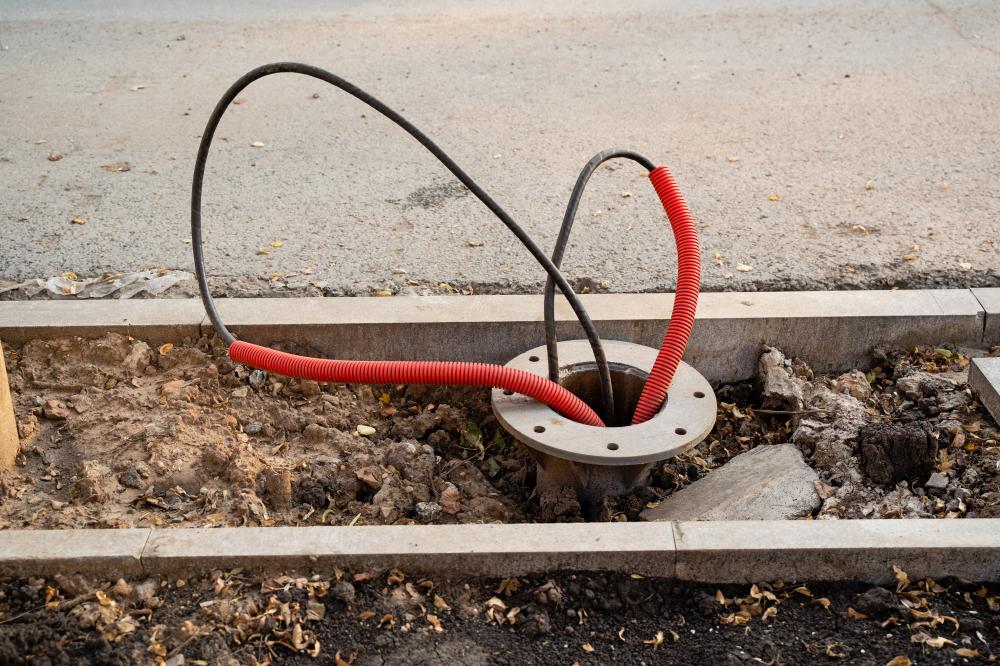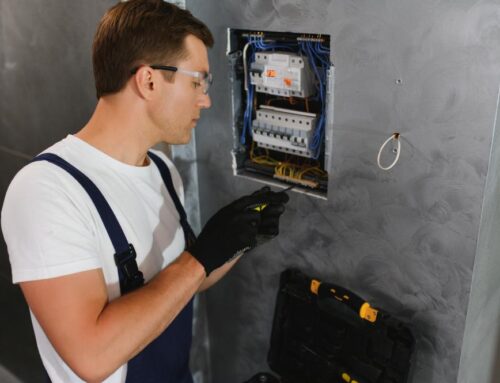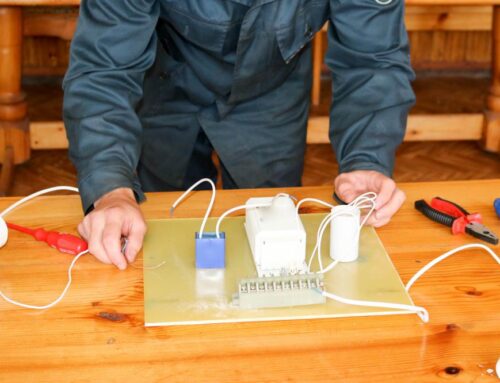
Understanding the Basics of DIY
Knowing when to DIY vs. when to call an electrician can be a crucial skill for homeowners. Tackling small electrical tasks yourself can save both time and money. Simple activities like replacing a light bulb or installing a dimmer switch can often be done without professional help.
However, even these seemingly straightforward tasks require caution. Always ensure the power is turned off before starting any electrical work. Use the correct tools and follow safety procedures to avoid accidents. Being aware of your limitations is also part of responsible DIY work.
Some jobs may appear manageable but can quickly escalate into something more complex. It's important to assess the risk involved. If unsure, calling a professional is the safest option. Trust your instincts and, when in doubt, seek expert advice.
When the Pros Should Step In
Tackling certain projects yourself may not be advisable, especially when dealing with intricate electrical systems. Understanding when to DIY vs. when to call an electrician is crucial. Complex installations, such as electric vehicle charger stations, typically require a trained expert.
Issues like frequent circuit breaker trips or buzzing from walls are definite red flags. These could indicate deeper, potentially hazardous problems. Professional electricians are trained to diagnose and address such issues safely and efficiently.
Additionally, any work that involves the electrical panel should be left to the pros. A mishandled panel can pose severe risks, including electrical fires. It's best to rely on those with expertise to ensure safe and effective solutions.
Another critical situation is when you encounter flickering lights or outlets that feel hot to the touch. These symptoms might signal serious underlying problems. Consulting with a skilled electrician can prevent further complications down the line.
Benefits of Professional Electrical Services
Choosing professional services comes with a plethora of benefits. Electricians bring a wealth of knowledge and skill, providing peace of mind. Whether it's complex repairs or simple installations, their expertise ensures the job is done right.
Safety is a top concern. Pros follow strict safety standards, reducing risks significantly. They also adhere to local building codes, which is essential for compliance and insurance purposes.
Moreover, professional electricians offer warranties on their work. This means you're covered if any issues arise post-service. It's an added layer of security, reassuring you that your home is in capable hands.
Lastly, hiring an expert can save time and stress. Their efficiency and access to specialized tools make a noticeable difference. With professionals, you can expect timely and reliable solutions, allowing you to focus on other priorities.
Weighing Cost vs. Value
Considering cost is inevitable when deciding when to DIY vs. when to call an electrician. DIY may seem economical initially, yet it could lead to costly repairs if mishandled. Weighing these factors is vital in making an informed decision.
Hiring a professional might seem more expensive upfront, but it offers substantial value. Quality work avoids future issues, ultimately saving money. Additionally, professionals bring peace of mind with their guarantees and expertise.
When evaluating cost, think about potential risks and the scope of work. Complex projects often justify the expense of professional services. Ultimately, prioritizing safety and quality can prevent unnecessary headaches and expenses.
Personal Experiences with Electrical Work
Reflecting on past encounters with electrical work can shed light on when to DIY vs. when to call an electrician. Personal experiences often highlight key learning moments that shape cautious decision-making.
I once tried fixing a faulty outlet myself, thinking it was a minor issue. However, I ended up causing a small spark, which scared me into realizing the importance of professional help. It was a valuable lesson in understanding my limits.
A neighbor faced a similar dilemma when their circuit breaker kept tripping. They opted for professional assistance, which revealed a significant wiring issue that could have escalated into a fire. This experience underscored the value of expertise.
These anecdotes can guide others in their decisions, emphasizing caution and awareness. Learning from real-life situations helps inform better judgments regarding electrical work.

Proper Grounding Techniques
As a top electrical service provider, we emphasize the importance of proper grounding. Grounding not only stabilizes voltage levels but also prevents electrical surges from causing damage. Grounding rods and high-quality materials are crucial to achieving reliable grounding.
Ensuring that all electrical systems are grounded properly provides a path for excess current. This minimizes the risk of electric shock and fire hazards. Our technicians employ meticulous methods to install grounding systems that stand the test of time.
Circuit Installation Safety
Assessing Load RequirementsBefore beginning any circuit installation, we carefully assess the load requirements. It's crucial to avoid circuit overload, which can lead to dangerous overheating. Our experience means we can determine load requirements accurately and install circuits that meet your specific needs.
Choosing the Right Circuit TypeDifferent appliances demand different circuit types. By choosing the correct circuit, we ensure that electrical devices operate safely and efficiently. This can prevent unnecessary strain on your electrical system and mitigate potential hazards.
Electrical Systems Maintenance
Routine maintenance of electrical systems is an essential practice. This process includes tightening connections and examining for any signs of wear. Regular upkeep helps in identifying issues early, reducing the risk of accidents.
We conduct inspections of all components, including examining circuit breakers, to guarantee they function correctly. This proactive approach enhances safety and prolongs the life of your electrical systems. Consider scheduling an annual check-up to keep your system in peak condition.
Whether it's homes or businesses, electrical hazards should never be underestimated. We advise clients to be aware of their systems' condition by maintaining a routine inspection schedule, thereby securing their property and loved ones.
Safe Use of Electrical Equipment
Understanding Equipment LimitationsEach appliance has specific electrical specifications. Understanding these limitations ensures that devices are operated safely, preventing malfunctions. This is essential for minimizing electrical risks.
Precautions When Operating DevicesAlways handle electrical equipment with dry hands. Never overload outlets, and avoid running cords under carpets. These simple precautions can make a significant difference in preventing hazards.
Unplugging Devices When Not in UseUnplugging unused devices is an easy yet effective safety tip. It reduces the risk of overheating and protects appliances from power surges.
Awareness and Prevention of Hazards
Awareness comes first in maintaining electrical safety. Common hazards such as frayed cords, exposed wires, and overloaded circuits need attention. Addressing these can mean the difference between safety and a potential accident.
In environments like homes or commercial spaces, electrical hazards require a combination of awareness and preventive measures. Each setting has unique considerations; by training employees and educating family members, we ensure a safer environment for everyone.
Preparedness for emergencies is also vital. Knowing how to respond when an electrical incident occurs can mitigate damage and reduce injury risks. We recommend having a plan in place for every household or business.
Understanding Common Electrical Problems
In my years providing electrical services, I've encountered countless Common Electrical Problems that can impact homes. These issues can range from minor nuisances to serious hazards. Recognizing them early is crucial. An electrical system that appears flawless can hide underlying faults, which is why professional vigilance is essential. Offering a quick diagnosis and solution preserve both your peace and safety.
Homeowners often overlook signs of deterioration in their electrical systems. A flickering light might seem trivial but can indicate a deeper issue. Loose connections or damaged wiring can be the underlying cause. Addressing these Common Electrical Problems promptly is paramount. Ignoring them can lead to costly repairs or even dangerous situations.
The Personal Touch in Solving Electrical Issues
When I step into a client's home, I prioritize understanding their unique situation. Personal insights into Common Electrical Problems allow me to provide tailored solutions. I've learned that no two homes are exactly alike. Their electrical quirks often reflect specific usage patterns and previous maintenance practices. This personal approach is what sets our service apart.
Not only do I address the technical side, but I also consider the human aspect of electrical issues. For instance, a family with young children might have a different set of concerns than a single professional. This perspective helps me advise on preventative measures and enhances our client's experience.
It's about more than just fixing faults; it's about building trust. Our clients know they can rely on us for honest advice and effective solutions to Common Electrical Problems.
Innovative Solutions for Common Electrical Problems
One of the most rewarding parts of my job is finding new ways to solve Common Electrical Problems. Technology constantly evolves, offering fresh solutions. For instance, smart home technology can mitigate issues like surges and circuit overloads. These modern solutions are both efficient and user-friendly.
I've integrated these technologies into my services, providing clients with innovative options. As a result, they benefit from enhanced safety and convenience. Utilizing advanced tools, we can preemptively address problems, reducing the likelihood of future incidents.
Collaborating with my team, I've developed unique strategies tailored to specific issues. Whether it's retrofitting an old wiring system or suggesting energy-efficient upgrades, the aim is always to provide the best possible outcome.
Our approach is proactive, not reactive. By staying updated on industry advancements, we offer solutions that not only fix current problems but also prevent new ones from arising.
Navigating Challenging Electrical Landscapes
The complexity of some Common Electrical Problems can be daunting. I've encountered homes with intricate setups that require a delicate touch. The key is not to rush. Patience and precision are crucial when dealing with challenging scenarios.
For instance, older homes often present unique challenges. They might have outdated systems that aren't compatible with modern appliances. In such cases, careful evaluation and strategic planning are necessary to ensure safety and functionality.
Every challenge is an opportunity to learn and grow. By embracing this mindset, I consistently find efficient ways to resolve even the toughest electrical issues. This adaptability is vital in an ever-changing field.
Commitment to Quality and Customer Satisfaction
At Beverly Hills Electrician Pros, quality service is our cornerstone. We approach Common Electrical Problems with a commitment to excellence. This dedication ensures our clients feel valued and secure, knowing their electrical needs are in capable hands. Our team is devoted to maintaining high standards in all aspects of our work.
Through constant communication and transparency, we keep clients informed throughout the process. This not only builds trust but establishes lasting relationships. Our clients know we prioritize their safety and satisfaction above all else.
Ultimately, my satisfaction comes from seeing a job well done and a client who feels at ease. Solving Common Electrical Problems is just the beginning; our true mission is ensuring peace of mind for every homeowner we serve.

When to DIY vs. When to Call an Electrician
How do I know when to call an electrician?
Knowing when to call an electrician can be a critical decision for any homeowner. At Beverly Hills Electrician Pros, we often advise considering a few key factors. Firstly, if you encounter symptoms like frequent circuit breaker trips, flickering lights, or unusual noises such as buzzing from outlets or walls, these can be indicative of deeper electrical issues that require a professional's diagnosis. Another sign is encountering outlets or switches that are warm to the touch; this could hint at underlying wiring issues. Similarly, if there's water damage near electrical components, it's vital to bring in a specialist. Remember, safety should always be your top priority, and when in doubt, it's better to consult an expert to prevent potential hazards.
What is the difference between a handyman and an electrician?
The key distinction between a handyman and an electrician lies in their training and scope of work. An electrician is a professional who has undergone extensive training and certification specific to electrical work, ensuring they understand the intricacies of electrical systems. They are adept at handling complex tasks like rewiring, installing new electrical systems, and troubleshooting issues safely and effectively. On the other hand, a handyman may have a broad set of skills encompassing various small household repairs and improvements, but they lack the specialized training to address significant electrical tasks. While a handyman can handle simple jobs like replacing a light bulb or repairing a minor fixture, an electrician should be called for any work involving your home's wiring or electrical safety to ensure compliance with local codes and safety standards.
How do I know I need an electrician?
Recognizing when you need an electrician involves assessing the complexity and risk level of the issue you're facing. For instance, projects like installing a ceiling fan might seem straightforward but can be complex if new wiring or circuit considerations are involved. Our general rule at Beverly Hills Electrician Pros is if you are uncomfortable or unfamiliar with the task or if it involves your electrical panel, it's best to consult a professional. Additionally, if you're upgrading to more sophisticated systems, like installing an electric vehicle charging station, it's prudent to rely on an electrician’s expertise to ensure safe and efficient installation. Ultimately, if you're unsure whether a task is within your capability, err on the side of caution and seek professional advice.
Can I DIY electrical projects?
Certain electrical projects can indeed be tackled by DIY enthusiasts, provided you have the right knowledge and safety precautions in place. Simple jobs like changing a light bulb, replacing covers for switches, or even installing a dimmer switch can often be handled without professional intervention. However, it's crucial to always prioritize safety: ensure the power is turned off before starting any project, and use appropriate tools correctly. At Beverly Hills Electrician Pros, we emphasize understanding your comfort level and expertise. If at any point you feel uncertain or the project begins to seem more complicated than anticipated, don’t hesitate to call an electrician. Remember, while DIY can save money initially, improper handling of electrical tasks can lead to more significant expenses down the line due to potential damage or safety risks.
Electrical Safety Tips
Safety is paramount when it comes to electrical systems, and there are several key practices to keep in mind. First, ensure that your electrical devices are used according to their specifications; overloading an outlet is a common mistake that can lead to circuit damage or fire hazards. At Beverly Hills Electrician Pros, we recommend regular inspections of your electrical system. Look for signs of wear, such as frayed cords or discolored outlets, and address these issues promptly. Implementing routine maintenance can help identify problems before they escalate. Additionally, always handle electrical devices with dry hands and keep them away from water sources. By following these precautions, you can significantly reduce the risk of electrical accidents in your home.
Common Electrical Problems
Common electrical problems can range from simple annoyances to serious safety hazards. Flickering lights, for example, might seem minor but can indicate issues with wiring or circuit overloads. Frequent breaker trips often suggest more significant wiring issues or overloaded circuits and should be addressed by a professional. At Beverly Hills Electrician Pros, we often encounter loose outlets or switches, which could pose a shock hazard. Proactively dealing with these common issues not only maintains the safety of your home but also ensures the longevity and efficiency of your electrical system. If you notice any unusual electrical behavior, it's advisable to consult an electrician to diagnose and resolve the problem promptly.
#### Resources for Electrical Safety and Professional Services- Occupational Safety and Health Administration (OSHA): OSHA provides guidelines and regulations to ensure safe working environments, including electrical safety standards crucial for both professionals and DIY enthusiasts.
- U.S. Consumer Product Safety Commission (CPSC): The CPSC offers resources and information on consumer product safety, including tips on electrical safety in homes to prevent accidents and injuries.
- U.S. Department of Energy: This government site provides insights on energy efficiency and safety, including guidelines for safely using electrical systems and devices in residential settings.
- National Fire Protection Association (NFPA): The NFPA sets codes and standards aimed at reducing fire hazards, including those related to electrical systems, which are crucial for both professionals and homeowners to understand.
- National Institute of Environmental Health Sciences (NIEHS): NIEHS offers information on environmental health and safety, including electrical safety recommendations that help minimize risk in both home and work settings.
- National Institute of Standards and Technology (NIST): NIST provides resources and research to ensure safety in various standards, including electrical systems, to help professionals and the general public stay informed on best practices.


